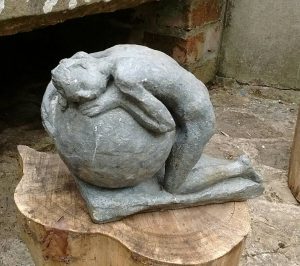This Week’s Bit of String: Saying good night at Grandma’s house
During a visit when I was eight, my Grandma came to tuck my sister and me in. She was a pre-school teacher, and as a matter of strict policy, she made a great deal of time for us and never got cross.
Granddad was different. He blustered rather than spoke, worked long past retirement rather than played. We were a bit scared of him. I’d watched Grandma sweetly placate him for my whole life, and it stumped me.
‘Grandma,’ I whispered as she kissed me goodnight, ‘Do you really love Granddad?’

She just laughed and left the room. Minutes later, Granddad himself appeared, giving his version of a chuckle, which still sounded blustery. ‘So you think your grandmother doesn’t love me?’
Like any of us, over the years I learned much more about the inexplicable, often unwelcome persistence of love. I watched Granddad lose Grandma to lung cancer a month before their golden wedding anniversary, and there was no mistaking she was loved in return. I’ve seen that reciprocation is often enough; that we can make ourselves settle when we choose to.
But I still wonder about it. Why do we love who we love? How is love sustained and and to what extent can it be manipulated or cajoled or banished entirely? Again, I suspect I’m not alone in wondering these things.
Opening Questions
When we start planning a novel, we’re told to start with a question, a predicament. That’s handy, as I’m writing about Eve and there’s a lot to question in the Biblical story of creation, of Eden and the fall and the alleged first generations of humanity.
Example: Adam and Eve have two boys, Cain and Abel. Cain kills Abel and gets exiled. At this point the Bible has named only 3 still-living humans on the entire planet.
Then it says Cain’s wife got pregnant (presumably a sister too lowly to be named) and has a son called Enoch. So now we have five people on the planet. Maybe a few other girls who the Author couldn’t be bothered to bring up.
THEN it says, when speaking of Enoch’s birth, ‘Cain was building a city at this time, and named the city for Enoch.’
Wait, what? Building a city for whom? Angels? Demons? Animals? Aliens?
Plenty of scope for the imagination, then. More questions in last week’s post about believing what we read. More questions, many questions.
The Overarching Question
But the one that interests me most of all in this story is love. Did Adam and Eve love each other? Can you truly love someone when there’s no other person in existence, so you haven’t chosen them as such? How can you keep loving each other after together, you brought curses down on all future generations?
I guess to me, these are the questions that matter most—more, as I discussed last week, than whether any of it is true or not. I suppose it’s because these are the questions that pop into my head in real life, and they’re the ones that led me to my first line of this story, and it spiralled from there:
‘You must understand, I was made to love your father. For that reason, I sometimes hate him.’
At the moment, I’m writing in first/second person point of view, as Eve addresses her lost favourite daughter—exiled with Cain. If we work with the scenario that Adam and Eve were the first and only humans, they’d have had to have quite a few kids, and to play matchmaker, convincing them to breed.
(Or maybe there would have been little persuasion required. Humans aren’t always fussy about that sort of thing, but let’s not go there for now.)
Given Eve’s own background—unnamed for the first 3 chapters of Genesis, so often referred to as simply ‘the woman’ or ‘Adam’s wife,’ how might she have felt about these pairings, and her role in orchestrating them?
So my novel’s overarching question is incorporated with the first line and the point of view.
Cosmic Questions
Beyond being reflected in the relationships of her children and other descendants, Eve’s feelings for Adam also, I think, are tangled up with spiritual questions.

After everything, could Eve and God love each other? I’ve just written my first scene in which God appears—quite a challenge, playing God, which I’ll elaborate on in a later post. There’s the guilt over letting Him down in Eden—but also the struggle to understand why He allowed her to in the first place.
And she must have wondered, before any of us came along to wonder the same exact thing for centuries: What the hell are we for? For Eve, who knew God as her creator and as an actual physical presence, she must have wondered why He made her and Adam. Just to serve Him, like the angels did? Were they given free will so they could choose to love Him and therefore make their elective devotion more meaningful? I think she’d have mixed feelings on that theory, given everything she went through and all she lost.
Have you come to any conclusions on these matters? How do you set up characters to love each other, without making it look like a setup?





